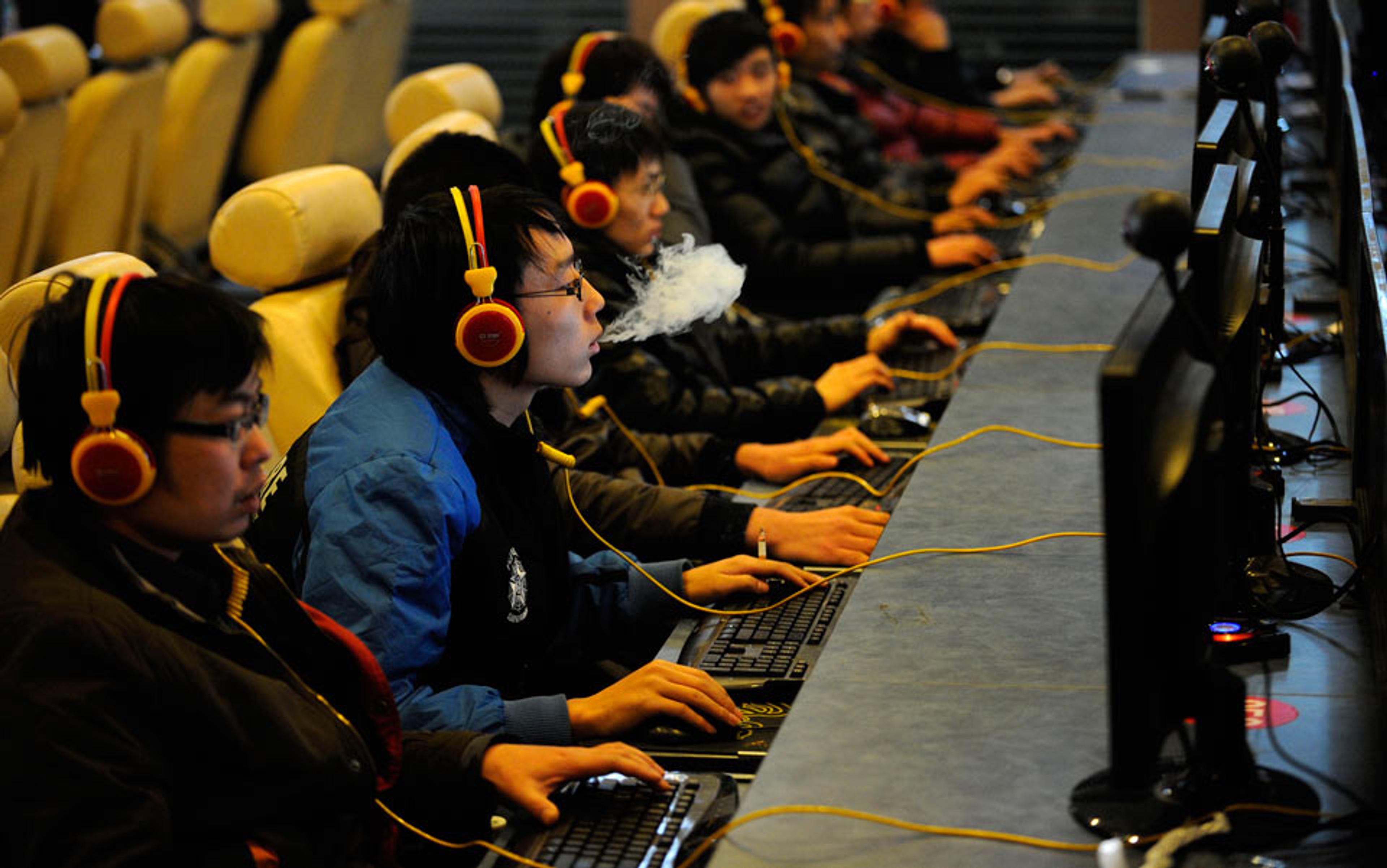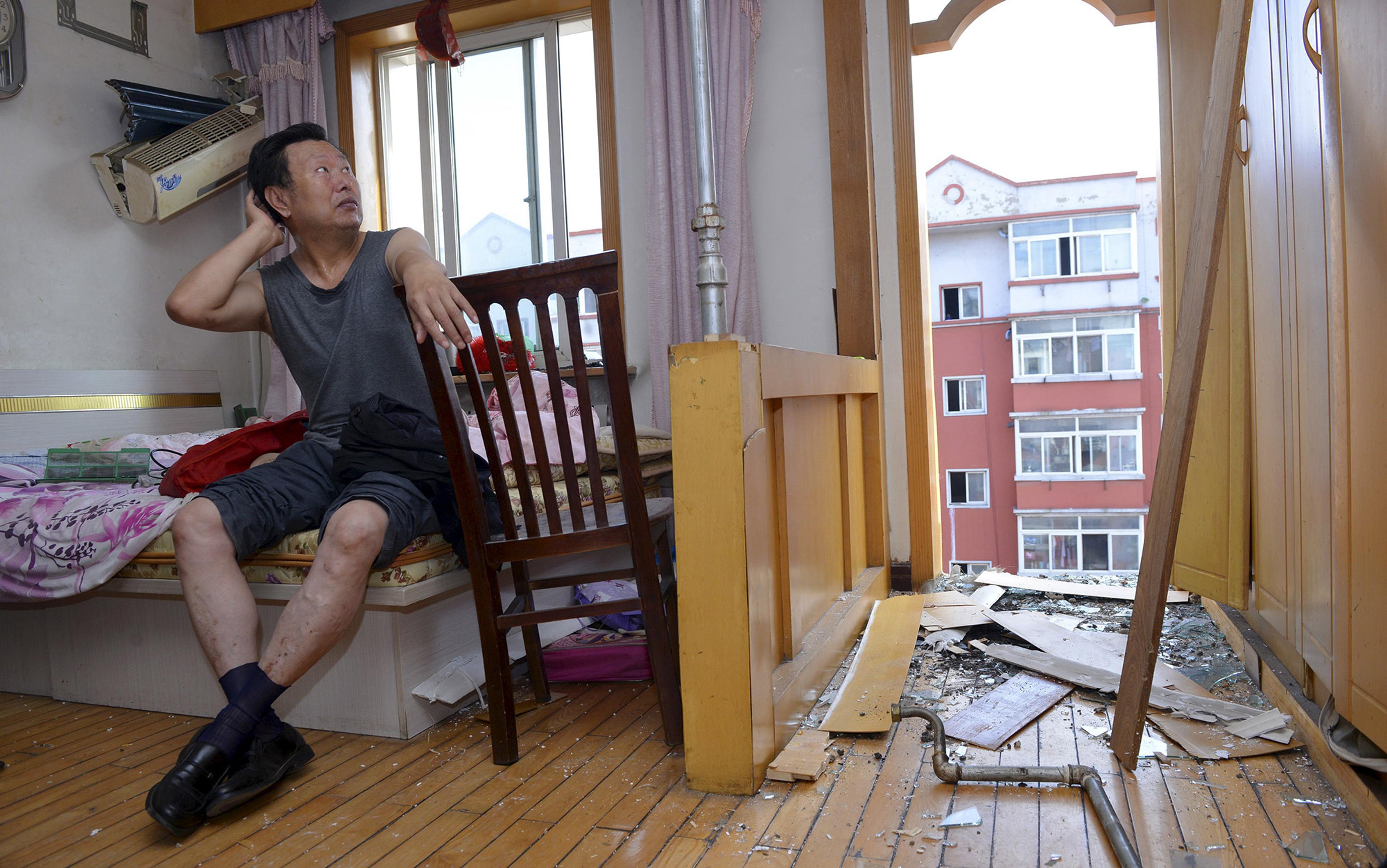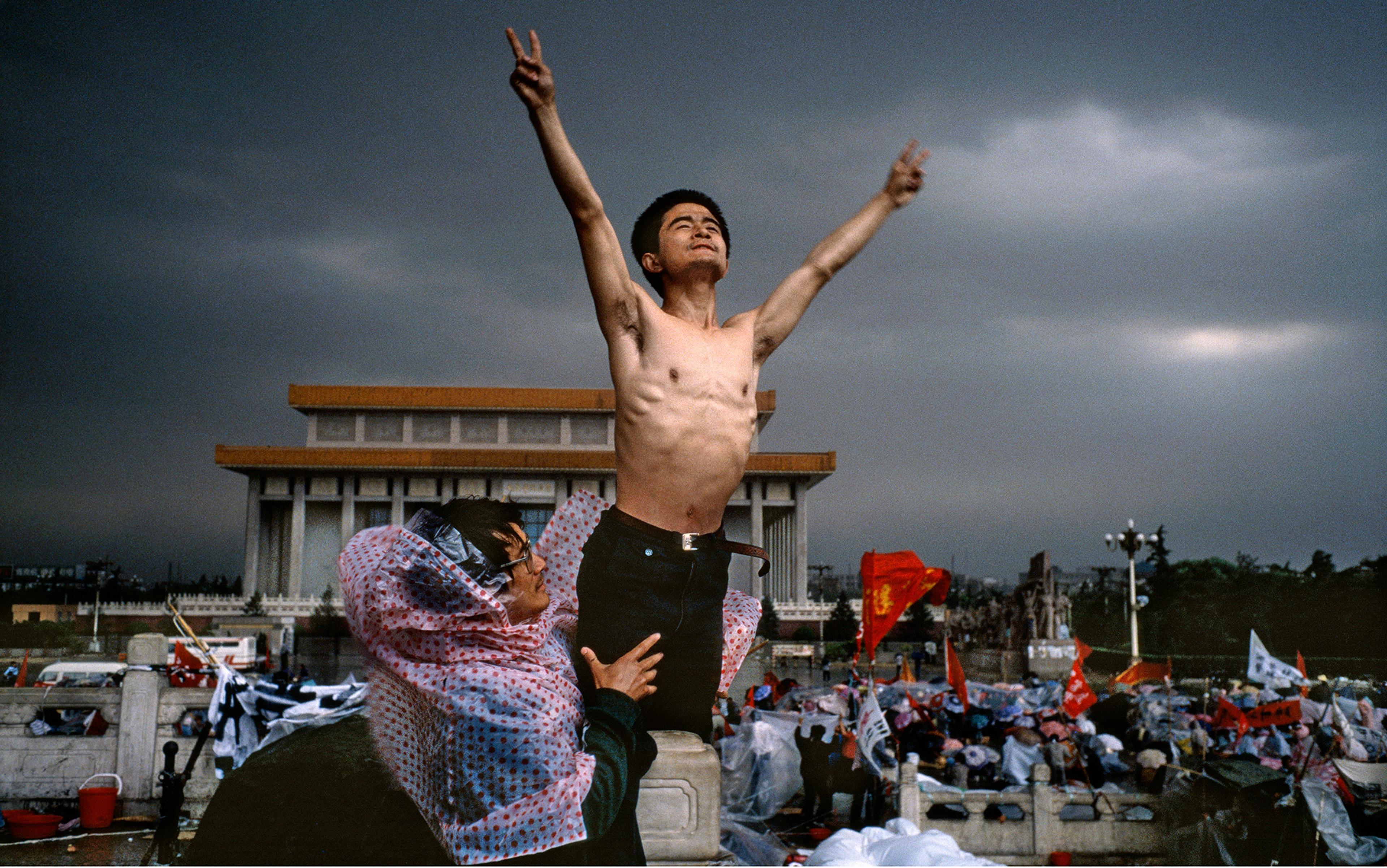Five young men sit in the living room of a large, grubby apartment in downtown Shanghai, playing a computer game. The room is mostly quiet, except for the hum of the computers and the steady click and keyboard-tap of the players, who wear headphones that envelop their ears and slouch in worn office chairs. A rotund, bespectacled gamer known as PDD is the most outspoken of the bunch, periodically shouting Wo cao! (‘Fuck me!’) at a setback, or leaping out of his chair to smother the adjacent player’s face with his large blue shirt in a moment of triumph.
Aged in their teens and early 20s, they are professional players of League of Legends(LoL), a competitive online game in which two teams of mythical characters called ‘champions’ battle it out in a fantasy arena. The objective of the game is to destroy the enemy’s base through a series of intricate moves involving teamwork, strategy and the nimble use of keyboard and mouse. The stakes are real because victory could earn the players huge cash prizes.
The online warriors of Shanghai’s famous Invictus Gaming club, or iG, who live and train together in the slovenly apartment, are hardly typical of urban Chinese their age. But their stories reflect much of what’s exciting and surreal about the brave new world being created by China’s ballistic economic and technological ascent. From varied places and economic backgrounds, they have gathered in Shanghai to earn a living through ‘eSports’, or digital combat. Like millions of other Chinese, the gamers and their organisers are chasing success in ways their parents’ generation can barely comprehend.
In a live match in the Polish city of Katowice last March, these same five cyber athletes took on a London-based team called Fnatic. The four-day tournament, sponsored by Intel and other computer hardware companies, offered a $60,000 prize to the winning LoL team (other teams also competed at the game StarCraft II for a $100,000 prize). Wearing headphones and uniformed tracksuits or T‑shirts, each team of sober-faced gamers clicked and tapped away at a row of computers in a packed sports arena. The audience watched the gameplay on giant screens.
Four minutes into the match, PDD’s champion, Shyvana (‘the Half-Dragon’), defended a tower by lobbing crystal-like projectiles at critters called minions. Elsewhere on the map, Fnatic’s tower emitted purple fireballs while another iG champion, Thresh, swung his chain at a winged demon called Nocturne, delivering a lethal blow. Nocturne’s lifeline dropped to zero and he burst into blue flame as the words ‘FIRST BLOOD!’ appeared on the screen. After 20 seconds more of chaotic action, a dance of twisting avatars and flying missiles far too furious for the untrained eye to track, two of iG’s champions converged on a fleeing enemy, Lulu. One of the gamers, Kid, controlling a champion called Vayne, shot a toxic arrow at Lulu, killing her in a bloody and prolonged explosion. ‘Kid picks up the kill!’ shouted one of the European men who were giving the play-by-play.
The young men of iG – founded in 2011 by Wang Sicong, son of Wang Jianlin, a property and film tycoon and one of the wealthiest men in China – play for love of the game but also for money. The club is partly funded by Wang Sicong, but it also enjoys corporate sponsorship from Logitech, a computer accessories maker, and ASUS, a PC vendor. The iG club pays the gamers a base salary of about 4,000-5,000 yuan per month (around US$650-$800) and covers their room and board. On top of that, the gamers can rake in lavish prizes from live matches in China or abroad. In 2012, the division of the club that now plays Defense of the Ancients 2 (Dota 2), another wildly popular online game, split a $1 million first prize in Seattle. The prospect of even bigger winnings beckons; a Chinese team called Newbee took home $5 million from the same event last July.
The iG club’s manager Zhu Songge, who goes by the name Lucien, told me that one of the team members, Kid, earned roughly 400,000 yuan (about $64,000) last year – a princely sum for a 16-year-old from Henan province, where the average urban disposable income is about 5 per cent of that. The gamer, known as Ge Yan in real life, used the money to buy his family a house. Kid’s laconic, awkward manner belies the aggressiveness of his role in the game, which is to lead the team to victory by mowing down the enemy with deadly implements from crossbows to phosphorous bombs.
‘Sometimes I wouldn’t return home for dozens of days. Sometimes I would have the idea of hitting my parents’
Only the most outrageously skilled gamers – a tiny minority – can make a living this way. Lucien estimates that there are around 50 pro clubs for LoL in China, and 10 to 15 in Shanghai; each club has about five players. The elite, successful world of professional eSports draws its audience and its star players from a vast and problematic gaming subculture. For every well-paid Kid, there are tens of thousands of young gaming enthusiasts who play for fun. Many of them are compulsive gamers, logging countless hours in virtual worlds of adventure, fantasy and violence. Their habits are viewed by parents, teachers, and authorities mostly with disapproval and concern.
Far from Shanghai, in the city of Wuhan in central China, 17-year-old Zehao described his struggles with obsessive game-playing (in his case, involving the popular first-person shooter CrossFire) by telephone. ‘I used to be so addicted to the internet that I couldn’t free myself,’ he said. ‘Sometimes I wouldn’t even return home [from an internet café] for dozens of days. Sometimes I would have the idea of hitting my parents, or scolding them. I feel guilty about this now.’
The youth is a student of Tao Hongkai, a professor at Central China Normal University in Wuhan who counsels compulsive internet users. His mission is roughly the reverse of Lucien’s: to steer his charges away from online games. ‘I’m having class with them now,’ Tao said before handing the phone to Wang. ‘There are dozens of kids here with an internet addiction problem. One of them was always skipping class and not coming home because of his gaming. So his parents brought him here. After attending my class, he realised he would have to change his ways, because if he keeps playing like this he will destroy himself.’
China’s gaming scene is vast. The country’s internet population, which grows by tens of millions of people every year, includes an estimated 147 million hardcore online game users who spent more than $13 billion in 2013. In the process, they enrich companies such as the Shenzhen-based Tencent, owner of LoL’s US publisher and the largest gaming company in the world.
The heroes of the scene have good salaries and minor celebrity status, rewards that pushed them to go pro. One such gamer was Liu Hongjun, or ‘Kitties’. From a town near Chengdu, the capital of Sichuan province, the 21-year-old Kitties has an easy-going smile and a languid, friendly way of talking. A college graduate who studied pre-med with plans to become a doctor, he changed course when he discovered how much he loved gaming. At the time, he was earning 500 yuan (about $80) a month as an intern at a medical company, handling purchasing. He began playing LoL in his free time and quickly achieved a high rank, which brought him to the attention of a gaming team in Chengdu. The team recruited him and paid him 2,000 yuan in the first month. He later did a stint at another team before joining iG.
His feats of masterful tower-building and monster-slaying made him a minor national celebrity; he carried the flame during China’s 2008 Olympic torch relay
Kitties kept his new occupation secret from his parents until he started earning enough money to support himself. His father, who rests at home for health reasons, and his mother, who works at a factory, are pleased with his current career. Other people in his hometown are equally supportive – the money speaks for itself – but it’s not always easy for Kitties to make them understand what he does for a living. How does one explain multiplayer online battle arenas to an elderly relative in a small town in central China?
Li Xiaofeng, or ‘Sky’, a famous ex-professional gamer, faced a tougher path to success. Sky’s grades suffered from his tendency to slip away to internet cafés to play games as a middle-school student in the late 1990s. As a punishment, his father locked him in his room and beat him with a belt.
He eventually learned to put his talents to profitable use in the eSports scene, becoming the leading Chinese player of the strategy game Warcraft III. According to the website esportsearnings.com, Sky won more than $232,000 in tournament prize money from 2005 to 2012. His feats of masterful tower-building and monster-slaying made him a minor national celebrity; he carried the flame during China’s 2008 Olympic torch relay.
‘There isn’t this sense of, it’s okay for my kid to play eSports for 20 hours a day because he or she’s going to become a professional,’ said Marcella Szablewicz, assistant communications professor at Pace University in New York City and an expert on China’s internet gaming scene, when we met in Shanghai. ‘They talk about how [Sky] was one of those bad kids who spent all his time at an internet café, but then he became an eSports hero, and now he’s fantastic, and now we all love him. So how you get from that position to eSports athlete – there isn’t really a clear path.’
In a country where social mobility is closely linked to academic success, it’s understandable that most parents would rather see their kids hitting the books than honing their game-playing skills. A high score on the gaokao, China’s brutally competitive national college entrance exam, seems more attainable than a rarefied career as a salaried eSports athlete. But the pursuit of either goal requires total commitment.
When professional Chinese gamers are asked how to get involved in eSports, Szablewicz observes, they usually recommend finishing school first. ‘This is like the party line,’ she said, ‘because of course nobody finishes school first and then starts playing. The kids who get to be really good are not doing well in school probably.’
Ironically, the very intensity of the education system and the pressures it places on young Chinese people have helped to fuel the popularity of online gaming. ‘Really, this emanates from the internet café culture, which does not, to a large extent, exist in the United States,’ Szablewicz explained, referring to the eSports culture in both South Korea and China (eSports in the US evolved out of console gaming, unlike in China, where video game consoles were banned until 2014). ‘And I think that also the popularity of these internet cafés happened because of the fact that the school system here in China, and in Korea for that matter, is fairly restrictive. There isn’t much by way of cultivation of extracurricular activities. There’s so much focus on the college entrance exam.’
The phrase ‘electronic heroin’ has particular resonance in a country still touchy about mass opium addiction in the 19th century
Of course, concerns about excessive gameplay run deeper than parental angst over their kids’ grades. Authorities fear the social and psychological effects of mass online gaming. China was one of the first countries to label ‘internet addiction’ as a mental disorder, and hundreds of rehab centres, official and unofficial, have been set up to treat compulsive internet use, including harsh boot camps where adolescents are deprived of computers and subjected to military-style drills.
In 2007, Beijing issued new rules requiring gamers and other internet users to register with their real names and ID numbers. China forced game operators to install a ‘fatigue system’, in which players under 18 saw their points cut in half after three hours of play, and reduced to zero after five hours. A temporary nationwide ban on the opening of new internet cafés was imposed at around the same time.
The phrase ‘electronic heroin’, often used to describe online gaming, has particular resonance in a country still touchy over the disasters that mass opium addiction wrought in the 19th century. The fear is bolstered by disturbing lines of research showing that obsessive online gaming can cause neurological changes similar to those observed in drug addicts, including damage to the dopamine reward system.
State media report that more than 24 million young people in China are addicted to the internet, and officials have seized those numbers to explain many of the nation’s woes: compulsive web use is widely claimed to be a leading cause of mental illness, moral decay, and even juvenile delinquency. In 2005, a prominent Beijing judge reckoned that 90 per cent of youth crime in the city was related to internet addiction, and Tao, the teacher in Wuhan, cited similar figures. Whether or not such alarming claims have merit, binge-gaming is clearly a problem for the many people whose lives have been disrupted or destroyed by it. Reports of people dying after continuous, days-long gaming sessions hint at the possible dangers, as does a Chinese media report last July that a young, unmarried couple sold their two infant sons to child traffickers to help fund their purchases of in-game virtual items.
‘Scientists have found that playing computer games over the long term… can cause loss of emotional control’ in adolescents, Tao told me. ‘That’s why some people would rather play games than eat or go home. More than 20 students here have this problem – they don’t go home, they argue with their parents, and some even hit their parents.’ In another conversation, Tao said that internet addiction ‘is the main problem for all the families and schools’.
Experts such as Szablewicz, of course, find it difficult to blame online gaming for quite so much. She questions the alleged link between hardcore gaming and youth crime: ‘That’s the kind of really problematic language that happens here in the Chinese press, I think. The thing is that so many young people today are internet gamers or they play games, that of course if they track every single kid who’s ever played a game, they’re going to find these connections. It doesn’t necessarily suggest causality.
‘I don’t deny that there are kids with problematic behaviours with regard to gaming,’ she added. ‘I’m very critical of the term internet addiction, but I’ve talked to kids who’ve played 72 hours straight without standing up, you know, things like that. Maybe they use the bathroom, that’s it. It can be problematic.’
Observing iG’s members training in the apartment, I wondered what separated them from the Chinese adolescents hauled off to internet addiction boot camps. The gamers sharpen their skills at the computer for 12 to 14 hours each day. Their focus on the game is so relentless that I found most of them riveted to their screens even on a Sunday, their day off – sometimes goofing around or watching funny videos on the internet, but mostly just playing LoL. A headphone-wearing, chain-smoking PDD basically ignored his girlfriend, who lives in another room in the building, whenever she walked in to grab some computer equipment or bring him a snack. ‘I’ll play games my whole life,’ PDD told me at one point. ‘I think I can never stop.’
But playing at that level does, after all, take extreme physical and mental dedication; and I inevitably missed much during my few visits. ‘We’re young, we like sports,’ Lucien told me over dinner with his girlfriend Vivian, an eSports commentator, and Szablewicz one Saturday. ‘We like basketball, football. We like KTV [karaoke]. We don’t stare at our computer every day and play, play, play.’ Lucien pointed out that the team was going swimming the next day. ‘You can think of us as a football club – it’s all the same.’
The rise of powerhouse teams such as iG explains why the same government that wages war on gaming addiction has also recognised eSports as an official sport since 2003. State organisations help to run or sponsor gaming tournaments such as the annual World Cyber Games event, held in the Chinese city of Kunshan in 2012 and 2013. China’s State General Administration of Sport even has a bureau that oversees the development of eSports culture.
This divided approach to internet gaming has its own strange logic. So-called multiplayer online battle arena (MOBA) games such as LoL and Dota 2 – two of the most popular eSports titles in China – and real-time strategy (RTS) games such as Starcraft, which have start and stop points, are viewed as distinct from and more legitimate than massively multiplayer online role-playing games (MMORPGs) such as World of Warcraft, which continue endlessly. ‘Generally, the games that are seen as being most harmful and most addictive are these endless, massively multiplayer online role-playing games,’ Szablewicz said. ‘They’re seen as aimless, like they’re allowing young people to give into the fantasy of these virtual worlds. An eSports game generally lasts between 20 and 40 minutes.’ Of course, she added, that doesn’t stop anyone from playing one game after another, chain-smoking style.
More importantly, the Chinese government has learned not to block the rise of a thriving industry. A club such as iG is in some ways a prototype of China’s new economy – with an atmosphere more like a tech start-up than a home for troubled junkies. The slim and youthful Lucien is the polished, professional face of the club, handling iG’s business and relationships with sponsors, and supervising the players and coaches. A graduate of Shanghai’s prestigious Fudan University Law School, he started a law firm before switching careers. Lucien talks in terms that would be familiar to any young entrepreneur or ambitious professional in the West (or in China, for that matter). He wants to help develop the emerging eSports industry domestically, which he sees as more promising than law owing to its novelty and rapid growth. Lucien hopes to start an eSports school where gamers can train and study academic subjects all at once.
after age 22 or 23, gamers’ reflexes and eye-hand co‑ordination decline so much they must retire
The club’s LoL coach, an affable 26-year-old who goes by the name Snow, also comes across as a white-collar striver. Snow sits at a single desk in the back of the training room, wearing large white headphones with ear cups that pulse blue light. While the team members train, he watches and records their gameplay on his computer; afterward, they gather around his desk to review the videos and get feedback.
Snow, who wears sweatshirts and has an unruly mass of hair, is soft-spoken but reflects on his gaming life in rapid, articulate sentences that suggest he’s given it a lot of thought. After studying industrial engineering at college, Snow ventured into finance; he ran a store on Taobao, China’s giant e-commerce platform, and worked in currency exchange, but found he wasn’t really cut out for these jobs.
In 2013, another career option presented itself to Snow, who was a fan of iG: though too old by then to compete professionally (after age 22 or 23, gamers’ reflexes and eye-hand co‑ordination decline so much they must retire), he decided to try his hand at coaching. Along with related jobs such as managing and sports-casting, coaching is a common path for former gamers past their use-by date, as well as an option for enthusiasts such as Snow. ‘Basically, I tried different ways to improve this team, but finally found that these players are very talented and have their own thoughts,’ Snow told me. ‘I think I will hurt their understanding of the game if I try to impose my ideas on them by telling them what to do… I don’t interfere much during the training, and I let them bring their talent into full play.’
The rise of professional gaming in China creates new opportunities for highly gifted players, as well as for people such as Lucien and Snow, who bring deep insight and service-sector skills to a fast-rising new industry. For them, eSports offers yet another vehicle for ambitious dreams in an ever-expanding galaxy of choices. In the new world of China, every dreamer has a shot – and even the lowliest gaming addict might one day be a star.






